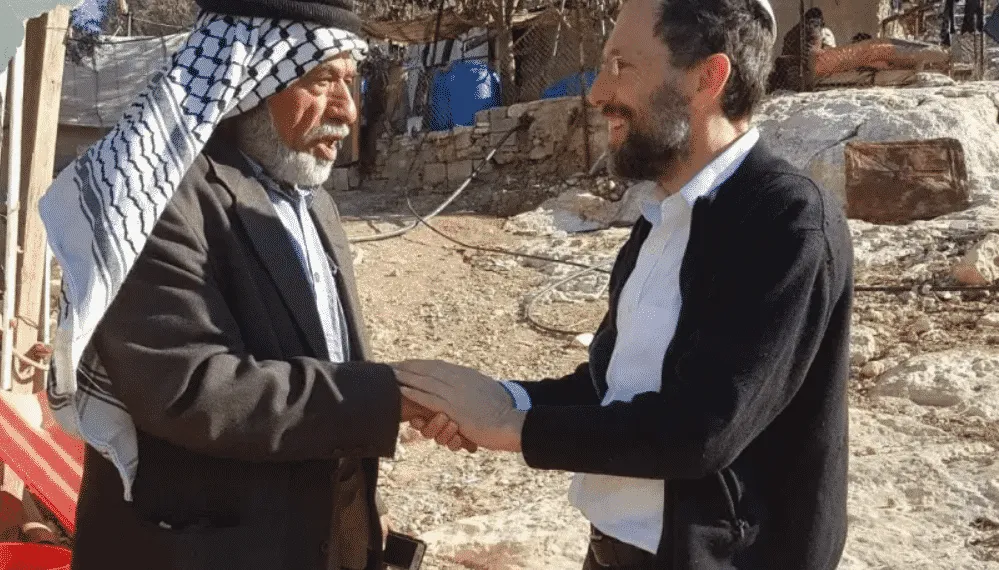
A Jewish seminary in Israel has launched a new interfaith program.
A great initiative. But what this Jerusalem Post article fails to mention is that Ohr Torah Stone is based out of Efrat - one of the so-called settlements.
Photo credit: Eyal ShaniComing off the heels of major normalization announcements between Israel and its Arab neighbors, Ohr Torah Stone has launched a program for interfaith dialogue.
The Blickle Institute for Interfaith Dialogue was launched with the official mission of giving an updated attitude of Judaism towards non-Jews when educating religious students and leaders. This updated attitude includes new approaches towards other religions, in relation to both non-Jews living in Israel and relations on a global level.
The institute and a corresponding Beit Midrash of Judaism and Humanity were developed in order to “engage leading educational and rabbinic figures from the Jewish religious community to be partners in creating a new paradigm for how Judaism relates to other religions and how the Jewish people relate to the non-Jews in our midst,” Ohr Torah Stone president and rosh yeshiva Rabbi Kenneth Brander said in a statement.
“With the return to Zion and the establishment of the state of Israel, we must define the halachic status of other religions according to Judaism and outline our responsibilities to the country's non-Jewish minorities. Our goal is to disseminate among our students and fellow community leaders a new approach that focuses on the reality that there is so much more that unites us as peoples of faith than the political and diplomatic divisions that so often cloud that truth,” said the institute's founding director Rabbi Dr. Yaakov Nagen, a scholar with a career steeped into interfaith dialogue, especially between Jews and Muslims.
--- “The vision of this Institute is to ensure that all peoples can be better educated about fellow monotheistic religions in a way that can foster better relations between our faiths and thus serve as a source of blessing for Israel and the entire world,” said Mr. Karl Herman Blickle, chairman of Stuttgarter Lehrhaus Foundation for Interreligious Dialogue.“The Jewish people has achieved so much on a national level in recent decades, but with that accomplishment comes a sense of responsibility in how we interact with minorities and peoples of other religions,” Brander explained.
“It's time that the religious Jewish community in Israel adopts a code regarding our religious responsibility to not just tolerate the 'other' but to engage and learn from the other, and to share that with our public intellectuals, our leaders and future leaders."
I have personal experience with it, having studied there and living in Efrat for a year, 27 years ago. As I wrote all the way back in 2003:
Ten years ago, I lived in Efrat for the year. I recollect how different things were back then. Rabbi Riskin, the Rabbi of Efrat, was friendly with muftis of nearby palestinian villages. Palestinians were constantly coming in and out of Efrat to make a living.Then last year I covered this story the mainstream media wouldn't dare
Last week Israeli residents from the Gush Etzion area commemorated a Palestinian fellow employee who had died a month ago from a brain hemorrhage at age 25.The Jews living in Judea and Samaria - commonly referred to as the "settlers" - are constantly demonized and their communities referred to as an obstacle to peace. While some may not be engaging in good neighborly conduct (not their neighbors are), this story shows you just how the situation is not as has been portrayed by the mainstream media and Israel-haters.Shadi Assad, who lived in the small village of Khallet Sakariya, located between the Israeli settlements of Alon Shevut and Rosh Tzurim in the Gush Etzion region, worked for the past five years as cleaner at the restaurant adjacent to the Gush Etzion Winery.
His colleagues decided to plant a tree in his memory, and chose an olive tree, which is so often featured in stories about clashes between Jews and Arabs in Judea and Samaria. Alongside the olive tree, they erected a tombstone with inscriptions in Hebrew and Arabic.
After the ceremony, which was also attended by rabbis from the area, including Rabbi Riskin of Efrat, one winery employee wrote: “I don’t know what peace would be like and how to bring it, but I know that a few hours ago I experienced a moment of peace. I feel the crazy complexity, the anger – but also neighborly and humane feelings.”
Not only are they not an obstacle to peace, but could be a key to it. It is through them that many palestinian Arabs can understand that living side-by-side can truly have its benefits.
I believe peace can only happen from the grassroots, and this initiative is a very positive step.
Posted from Israellycool with SteemPress : https://www.israellycool.com/2020/11/03/those-obstacles-to-peace-promoting-peace/